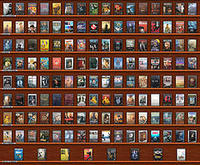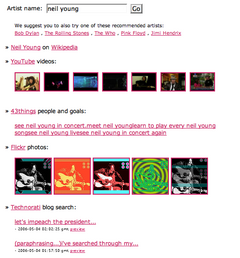29 May 02006
Now appearing on Futurelab's blog
Futurelab, the Brussels-based marketing and strategy innovation company (not to be confused with NESTA Futurelab in the UK), are now syndicating some of the articles from this blog on their site — see their announcement today.
Futurelab's blog assembles the best articles from a group of fifteen bloggers (so far; I am the most recent addition). I say 'the best' — the selection of articles is all down to them; it's interesting to me to see what other people see as interesting… Here's a full list of the twelve articles of mine on Futurelab's blog at the time of writing. (A small note about the Spectator article: I'm about to make the full version freely available when I get a few minutes.)
Continue reading "Now appearing on Futurelab's blog"25 May 02006
Groups and behaviour patterns among music listeners
Not all music listeners and digital consumers are the same. It's an obvious thing to say, but in what ways do they differ? Are there any groups or patterns of behaviour among them?
Youth subcultures are well known. Is it just my London perspective, or do people in the UK revel in the finer points of 'tribal' distinctions more than anywhere else? Channel 4 recently launched the UK Tribes website, dedicated to mapping the current groups here, from established subcultures like goths and grungers to myspacers, Nathan Barleys (explanation for non-UK readers) and blingers. However, this is a scattershot picture that doesn't give much sense of how the different tribes align and interact with each other.
In my book, I'm interested in the dynamics that drive word-of-mouth recommendations, including the types of people that make a point of spreading the word. The most useful data I've found has been published by Emap Advertising and is again UK-based (Emap owns several magazines and radio stations). In 2003 they did a first research study, under the name Project Phoenix, looking specifically at the attitudes towards music of people between the ages of 15 and 39. They identified four main degrees of interest in music.
Continue reading "Groups and behaviour patterns among music listeners"21 May 02006
A clutch of future-gazing events to plug
First is the b.TWEEN 06 forum of future entertainment, coming at the end of this week (25 and 26 May) in Bradford. The programme covers pioneering cross-platform work that straddles art and commerce. Sadly I can't make it this year, but I enjoed the 02002 event, and aim to be there next year.
I will however be at the one-day Content 2.0 event at the RSA, London, on 6 June. The programme looks interesting, as long as it doesn't descend too much into voodoo-speak and hand-waving about brands. If you'd like to attend, let me know, as I may be able to do a deal (for one person only) on ticket price.
Finally, I may be at the MusicStrands summer school on The Present and Future of Recommender Systems in Bilbao, 12-13 September, which includes participants from MusicStrands, Yahoo! and several universities. Thanks to Paul Lamere for flagging this.
17 May 02006
Behaviour patterns in collecting music and video
 I'm looking at patterns in how people collect different media, and how collecting relates to repeat listening/viewing/using. In the UK, estimates of the average number of CDs in a collection vary between 126 and 178 for men, 135 for women. Are there any similar figures for DVDs or games, or for US markets? I'm still looking.
I'm looking at patterns in how people collect different media, and how collecting relates to repeat listening/viewing/using. In the UK, estimates of the average number of CDs in a collection vary between 126 and 178 for men, 135 for women. Are there any similar figures for DVDs or games, or for US markets? I'm still looking.
I'm also doubtful about whether reliable figures exist for the number of digital downloads in collections. There was a report last year indicating that the average number of tracks on an MP3 player is 375, with 50% of players having fewer than 100 tracks. But this is a fast-moving, unstable area, clouded by allegations that 'most' tracks on players are 'stolen', which can't make it any easier to get reliable reports from users.
Continue reading "Behaviour patterns in collecting music and video"13 May 02006
Book announcement: Net, Blogs and Rock'n'Roll
People have access to vastly more music, video and other entertainment than ten years ago. In the case of music, record companies are releasing twice as many new albums per year. Not only that, but some are 'rescuing' old and deleted tracks for release in the digital marketplace.
So how do people find out about all this material? How do they judge what they might like? I'm writing a book that addresses these questions. The title is Net, Blogs and Rock'n'Roll: Who knows what's next in media and music in the new era of digital discovery and the download culture (the lengthy subtitle may change). It will be published next year by Nicholas Brealey Publishing, UK publishers of John Battelle's The Search and many other titles on digital enterprise and learning.
Continue reading "Book announcement: Net, Blogs and Rock'n'Roll"4 May 02006
Aggregating the non-music stuff about music
 The MusicStrands Labs seem to have a good head of steam at the moment: it's worth keeping an eye on their blog. The recent announcement that caught my eye was their music-related content discovery (we need a better term for this!) mash-up. The thumbnail on the right (click it to enlarge) shows the Wikipedia entry, YouTube videos, Flickr photos, blogs indexed by Technorati, and goals entered on 43things, all relating to Neil Young.
The MusicStrands Labs seem to have a good head of steam at the moment: it's worth keeping an eye on their blog. The recent announcement that caught my eye was their music-related content discovery (we need a better term for this!) mash-up. The thumbnail on the right (click it to enlarge) shows the Wikipedia entry, YouTube videos, Flickr photos, blogs indexed by Technorati, and goals entered on 43things, all relating to Neil Young.
It's a simple but effective application of Web 2.0, and would become even more valuable if and when it could aggregate reviews, interviews and gig listings in your country. All these 'collateral assets' can enhance people's discovery and learning about music. The MusicStrands tool is the closest thing I've seen yet to the outline for social software to enhance personal media collections that I wrote eighteen months ago.
3 May 02006
Spoofing music recommendation services and personalised radio
Music recommendation services and personalised radio stations like Last.FM depend on tracking the behaviour and preferences of their users, and building personal profiles on the basis of this. So what happens if the data you feed into these services isn't a human's preferences, but something else, like the programming of a traditional radio station or the output of another recommendation service?
At the risk of putting 2 and 2 together and making 5, there's another link here with last week's BBC Creative Future announcement. In the music section of the announcement there is a recommendation to "Enable people to create their own virtual radio channels out of the wealth of our existing output, channels reflecting their own personal tastes". That doesn't sound identical to Last.FM — which makes virtual radio channels out of a catalogue of music tracks reflecting users' personal tastes — but it is kind of similar.
Continue reading "Spoofing music recommendation services and personalised radio"2 May 02006
Experimental prototype of BBC Programme Catalogue
I missed this at first in the slew of announcements about the BBC Creative Future initiative, but last week the BBC launched an 'experimental prototype' of its programme catalogue, comprising details of nearly a million programmes (here's the relevant press release).
Tom Loosemore from the Beeb spoke about this at an event I attended last Thursday, and described his delight at finding the detailed records that their librarians had been keeping for decades. Just last week I was criticising the many online music databases that don't recognise that "The Beatles" and "Beatles, The" might be the same thing. The BBC benefits from having proper information professionals (and at the same time threatens them with job cuts, but that's corporate rationality for you).
Nevertheless, I did find the odd lapse in the data, along with a range of trainspotter entries, during a twenty-minute play with the catalogue. (These are simply observations, not criticisms, as they all fall within the disclaimer on the home page.)
Continue reading "Experimental prototype of BBC Programme Catalogue "1 May 02006
Celestial jukebox moves a little closer?
It's supported by ads, you can only play tracks five times, the tracks are streamed (not downloaded) and of modest quality, and (most significantly for me) it only works in the US, but apart from that, the free Napster service — launched today — is the closest thing yet to the vision of a 'celestial jukebox'. In that vision, people have access to all the music in the world on demand in return for a flat-rate payment.
The free Napster service is ideal for try-before-you-buy auditioning of music (and the recording industry will be pleased that it will help chip away at the argument that people 'only' use unlicensed peer-to-peer services for try-before-you-buy purposes).
Napster has also announced the horribly-named Narchive service, which sounds like an attempt to build a proprietary wikipedia for music. At the time of writing, though, the Narchive site just says "beta coming soon".

Subscribe to my RSS feed, which covers this blog, my book blog, and further commentary on other web resources (more feeds below)
Groups and behaviour patterns among music listeners
A clutch of future-gazing events to plug
Behaviour patterns in collecting music and video
Book announcement: Net, Blogs and Rock'n'Roll
Aggregating the non-music stuff about music
Spoofing music recommendation services and personalised radio
Experimental prototype of BBC Programme Catalogue
Celestial jukebox moves a little closer?
Cinema (24)
Cultural Calendar (86)
Curatorial (66)
E-learning (102)
Events (35)
Future of Music (95)
Human-Computer Interaction (62)
Ideas and Essays (37)
Long Now (18)
Miscellany (44)
Music and Multimedia (157)
Playlists (27)
Podcasting (12)
Politics (12)
Radio (48)
Reviews (58)
Social Software (60)
Teaching (23)
Alternatively, see the Date-based Archives
Recommended: RSS feed that combines items on this site, my book blog, and commentary on other web resources
RSS feed for this site only
RSS feed for my book, Net, Blogs and Rock'n'Roll
RSS feed for shared bookmarks
My latest bookmarks (click 'read more' for commentary):
My archived bookmarks (02004-02008)
On most social sites I am either 'davidjennings' or 'djalchemi', for example: Flickr, Last.fm, Ma.gnolia and so on…
Lateral Action — managing creativity
Herd — social cognition
Seb Schmoller's e-learning mailings
Viridian Design Movement
Tom Phillips — artist
Long Now blog — resources for long-term thinking
Longplayer live stream — 1,000-year composition

The contents of this site are licensed under a Creative Commons Licence except where otherwise notified.
Hosted by Paul Makepeace
W3C Standards
Check whether this page is valid XHTML 1.0
Check whether the CSS (style sheet) is valid

